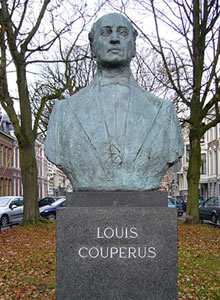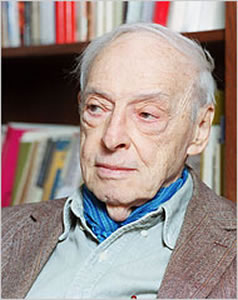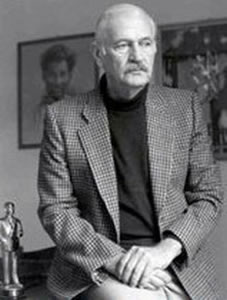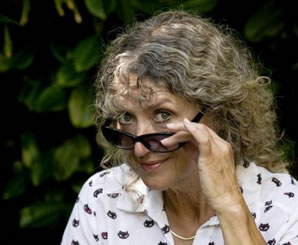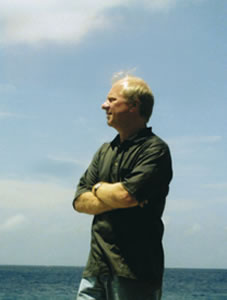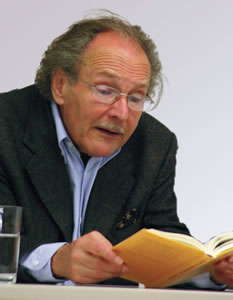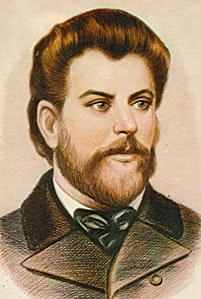De joods-Amerikaanse schrijver Saul Bellow werd geboren op 10 juni 1915 te Lachine, een voorstad van Montreal. Zie ook alle tags voor Saul Bellow op dit blog.
Uit: Ravelstein
“Odd that mankind’s benefactors should be amusing people. In America at least this is often the case. Anyone who wants to govern the country has to entertain it. During the Civil War people complained about Lincoln’s funny stories. Perhaps he sensed that strict seriousness was far more dangerous than any joke. But critics said that he was frivolous and his own Secretary of War referred to him as an ape.
Among the debunkers and spoofers who formed the tastes and minds of my generation H. L. Mencken was the most prominent. My high school friends, readers of the American Mercury, were up on the Scopes trial as Mencken reported it. Mencken was very hard on William Jennings Bryan and the Bible Belt and Boobus Americanus. Clarence Darrow, who defended Scopes, represented science, modernity, and progress. To Darrow and Mencken, Bryan the Special Creationist was a doomed Farm Belt absurdity. In the language of evolutionary theory Bryan was a dead branch of the life-tree. His Free Silver monetary standard was a joke. So was his old-style congressional oratory. So were the huge Nebraska farm dinners he devoured. His meals, Mencken said, were the death of him. His views on Special Creation were subjected to extreme ridicule at the trial, and Bryan went the way of the pterodactyl – the clumsy version of an idea which later succeeded – the gliding reptiles becoming warm-blooded birds that flew and sang.
I filled up a scribbler with quotes from Mencken and later added notes from spoofers or self-spoofers like W. C. Fields or Charlie Chaplin, Mae West, Huey Long, and Senator Dirksen. There was even a page on Machiavelli’s sense of humor. But I’m not about to involve you in my speculations on wit and self-irony in democratic societies. Not to worry. I’m glad my old scribbler has disappeared. I have no wish to see it again. It surfaces briefly as a sort of extended footnote.”

Cover
De Roemeense schrijver Ion Creanga werd geboren op 10 juni 1839 in Humuleşti. Zie ook alle tags voor Ion Creanga op dit blog.
Uit: Memories of My Boyhood (Vertaald door Ana Cartianu en R.C. Johnston)
“Heigh ho! Once I heard of the priesthood and of our priest’s little Smaranda, I gave up the flies completely and turned my thoughts to other things. I began to take to writing, to preparing the censer in church, to singing second, as if I were a respectable youngster. The priest put me down in his good books and little Smaranda flashed a glance at me now and then; Master Vasile entrusted the coaching of other boys to me, and, as the saying goes, a different kind of flour was now being ground in the old mill. Nică, Costache’s son, loutish and bullying, with his grating voice, had no further hold over me. But man proposes and God disposes!
One day, in actual fact it was St. Foca’s Day, the mayor ordered the villagers out to repair the road. The rumour went that the Prince was going to ride that way to visit the monasteries. Master Vasile found nothing better to do than to say: “Come on, boys, let’s help with that road, so that the Prince shan’t say, as he passes through, that our village is lazier than the others.”
So we all set out from school together. Some of us dug with spades, some carried stones in wheel-barrows, some in carts, some in kneading-troughs; in short, the people worked with a will. The mayor Nică, son of Petrica, with the overseer, the deputy-mayor and a couple of tousle-headed clerks, were moving to and fro among the people, when, all of a sudden, what should we see but a scuffle on the gravel, a crowd of people in a confused heap and one of them yelling out loudly. “What can this mean?” people were saying, as they ran from all sides.
Master Vasile had been caught with a lasso by the press-gang; they were now roping him tight and handcuffing him, preparatory to sending him off to the town of Piatra. So that’s why the mayor had summoned the people to communal labour! This was the way with deceptions such as these, that young men were in those days press-ganged into military service… This was an evil sight indeed!”

Cover Roemeense uitgave
De Turkse dichter Oktay Rifat werd geboren op 10 juni 1914 in Trabzon. Zie ook alle tags voor Oktay Rifat op dit blog.
Agamemnon I (Fragment)
We walked on, crushing the reeds and arrived at the valley; smoking, we leant against the ancient rocks.
We crouch on tbe earth – dear carth!- but they stand upright – chacun a
son gout! They say tbey are descended from gods and their mansions have
courtyards and fountains;
They play poker to the death on their rigged tables, they stack the cards and throw their bone chips for results,
They drink water from silver cups – blessed water! – we from the hollow
of our hands. ‘They have the fingers of cheats, ours are bony and
workworn,
They fall and bleed like rotten rowan trees and ache all
night long. And we mount the oxcarts to move away. The mountain-path is
easier at night.
We wait for the sparsely-feathered farm-bird to sing; but from a distance the little bastard is silent on our tree.
They
turned their fiery, sharp, savage weapons against us, with their
long-shadowed cruel spears, murderous as guns and mortars, shells and
bazookas!
We pruned the tree-trunks, thinned the tobacco-seedlings, hoed the cotton automatically, how can we stop caring for them?
Our wives like deer with young, humbled, sweaty, some with a hoe or a sickle, poppies on the plain bleeding inwardly.
It’s evening, white as sheep’s wool the Pole Star is born, a rustling tremor moves mountain and rock. When it says, ‘Come!’ you must up and leave, impossible not to leave!
Rainbows between two ages, great absorbent waterspouts moving in darkness, gushing skywards with rocks and earth,
And naked babies, village huts like leeches clinging to a barren mountainside, no windows, no tiles, made of poverty-stricken, sundried mudbricks.

De Duitse schrijver Peter Kurzeck werd geboren op 10 juni 1943 in Tachau, Bohemen. Zie ook alle tags voor Peter Kurzeck op dit blog.
Uit: Ein Kirschkern im März
“Mit vierzig. Im einundvierzigsten Lebensjahr. Als Gast, legal alsGast. Immer noch einen Tag. Schon der neunzehnte! Erst schonder neunzehnte, dann schon der zwanzigste! Die ganze ZeitMärz. Am ersten März eingezogen und jetzt auf einmal beeiltsich die Zeit, fängt zu rennen an. Und ich auch. Einen Regen-schirm mit und schnell-schnell alle Tage! Nutzt auch nix – wegdie Zeit und vergangen. Wie hat das geschehen können? Du hastsie aufgebraucht und das reut dich jetzt. Das hätte nicht seinmüssen. Vergangen die Zeit. Und bleibt vergangen. Schnell mitdem Schirm, große Schritte. Früher nie einen Regenschirm mitund jetzt nie mehr ohne. Durch die Trennung ein andererMensch: ein Mensch mit Regenschirm, mit Bedenken und Vor-behalten (die in seinem Kopf nach Dringlichkeitsstufen sortiertsind). Wie ging das denn zu? Im November einmal ein Regen-abend und zum Ersticken mein Leben. Gleich nach der Tren-nung. Die Wohnung wie unter der Erde. Und da hast du denalten Schirm, Karos, Streifen, Pünktchen, unregelmäßig verbli-chen ein Muster aus drei Sorten Grau, hast einen der beiden al-ten Regenschirme im Flur mitgenommen und schnell aus demHaus. Und seither mit diesem Schirm durch die Welt. Der Stoffeingerissen. Die Speichen verbogen. Der Griff wackelt. Ammeisten im Regen wackelt der Griff. Am Griff eine Schraube,die vorsteht. Nur schnell! Immer schneller! Im Geniesel, imRegen, besser noch schnell vor dem Regen her. Geduckt, einGespenst, ein eiliger Schatten. Und so durch den Spätherbst und Winter. Erst ein Regen- und dann ein Schneewinter. Mit Schirm.
Ein Mensch, der sich selbst nicht mehr traut. Immer den Schirmmit und mich daran festhalten. Auf jedem Weg. Als könnte ichandernfalls nicht auf der Welt bleiben. Früher nie einen Schirm.Früher mit Zuversicht und verträumt, laß dir Zeit, und die Weltmir entgegen. Vielleicht noch aus Staufenberg, vielleicht sogarnoch von meiner Mutter der Schirm. Vielleicht hat Sibylle ihnvor Jahren einmal gefunden.”

De Kroatische dichter en diplomaat Antun Mihanović werd geboren in Zagreb op 10 juni 1796. Zie ook alle tags voor Antun Mihanović op dit blog.
Lijepa naša domovino
Lijepa naša domovino,
Oj junačka zemljo mila,
Stare slave djedovino,
da bi vazda sretna bila!
Mila, kano si nam slavna,
Mila si nam ti jedina.
Mila kuda si nam ravna,
Mila, kuda si planina!
Teci Dravo, Savo teci,
Nit’ ti Dunav silu gubi,
Sinje more svijetu reci,
Da svoj narod Hrvat ljubi.
Dok mu njive sunce grije,
Dok mu hrašće bura vije,
Dok mu mrtve grob sakrije,
Dok mu ¸ivo srce bije!

Monument in Omiš
Onafhankelijk van geboortedata:
De Vlaamse dichter Tijl Nuyts werd geboren in 1993. Zie ook alle tags voor Tijl Nuyts op dit blog.
AĦMAR
in het beenzwarte licht van een stroboscoop
staat een dwerg met gesprongen lippen naar me te wuiven
ik wou dat hij mijn zoon was
ik kan het niet aanzien en ga op reis
halfweg september kom ik aan in de vossenstad
in het gras tussen de rails van het station
zitten sleutels verstopt, maar zelfs de simpele tover
van een anagram ontgaat de luie lezer:
azimut de stoter die slaand de verzen vouwt
rum met een reukje eraan in de bultenaarsschaduw van
de radcliffe camera, de snijbloemgeur van kaneel en uraan
de jongens die op onze kleuterklasfoto’s staan
kijken toe hoe ik de taal die mensen spreken
naar mijn roofridderburcht sleep
kijk!
onze silhouetten op slot tegen de akelmuur
een superman-t-shirt als een vlag om haar gespierde lichaam
in de nok voorbij de knik hikt ze soera’s in het schrift



















